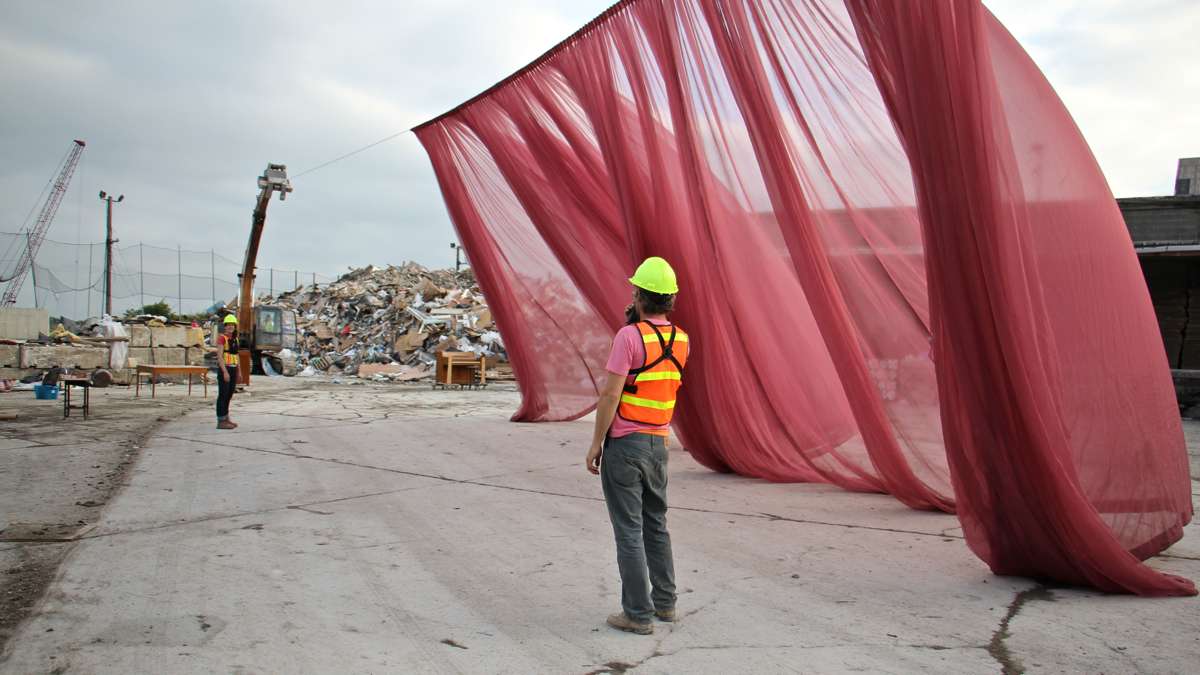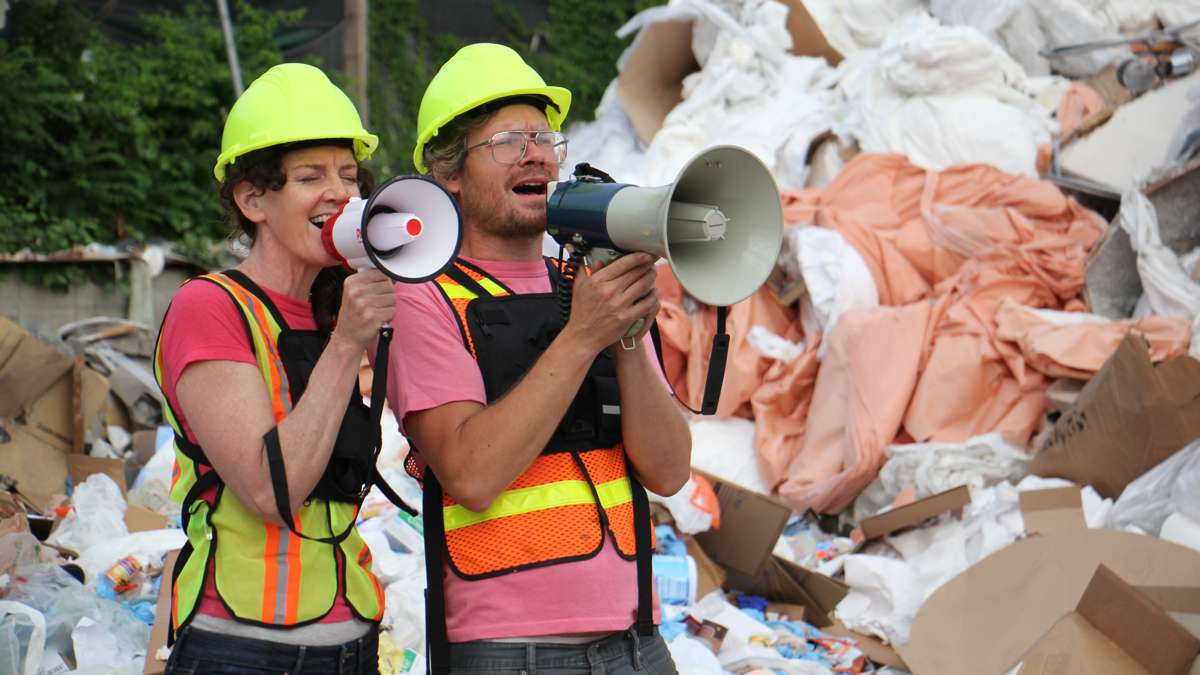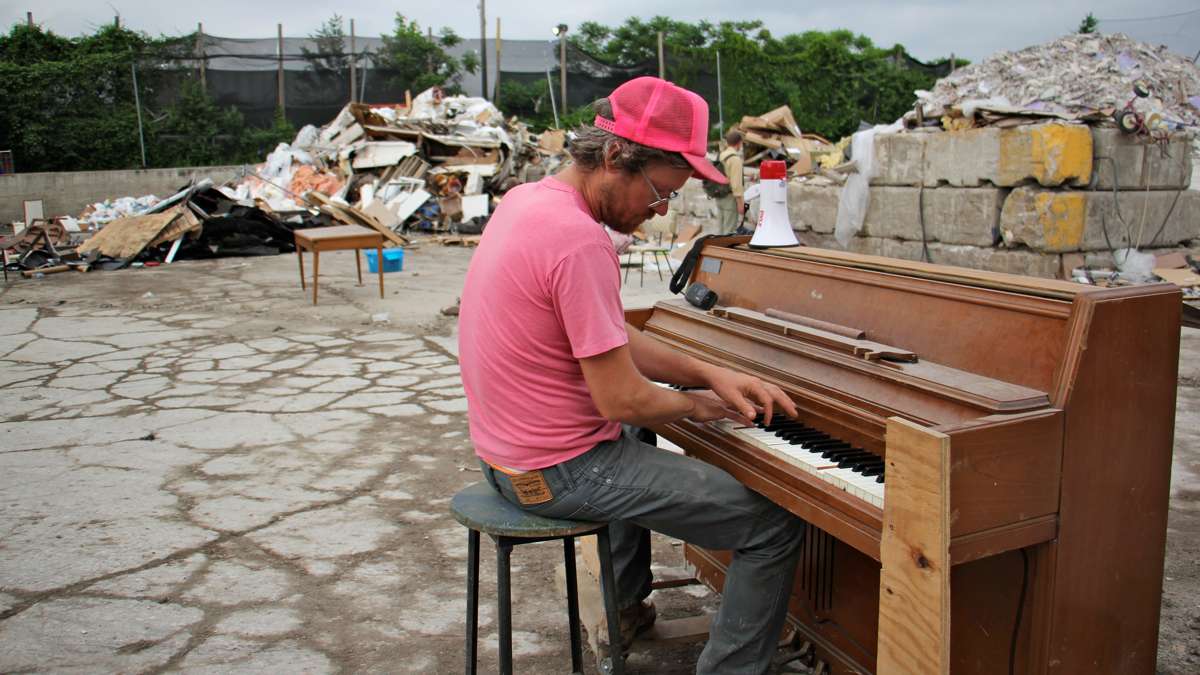Scraps of life resurrected, reimagined in performance at Holmesburg dump
ListenEvery day, Revolution Recovery in the Holmesburg neighborhood of Philadelphia receives 350 tons of trash, sorting it into piles for industrial recycling: the wood pile; the metal pile; the pile of broken concrete, drywall and plastics.
Another pile holds the refuse from domestic cleanouts: family scrapbooks; old guitars; jewelry boxes; framed artwork; and even, occasionally, a boat.
“That is the pile of stuff destined for landfill. That is stuff that can’t be recycled,” said Martha McDonald, a performance artist. “That’s the pile nobody wants, but that’s the pile I spent all my time in.”
McDonald is an artist in residency at Revolution Recovery. She has spent several months scanning the waste stream for poignant objects, pulling them out before the excavators get them:
Passports
Marriage licenses
A police badge and handcuffs
Autographs books
Pocket Bibles and Catholic scapular
A family photo album from the 1920s
19th century tin-type photos
Cartoons with dirty jokes drawn by soldiers overseas for friends at home
1,500 photos, which McDonald sewed into quilts.
They are fodder for “Songs of Memory and Forgetting,” a performance piece by McDonald and Billy Dufala, an artist and founder of the Recycled Artist In Residency or RAIR program. While McDonald tells stories (real or imagined) behind the objects she found, Dufala operates the yard’s heavy machinery in choreographed movements, and accompanies McDonald’s musings on piano and guitar.
Everything used in the show was found onsite, including the curtain to open and close the show, and all the musical instruments.
“There have been four or five pianos since I’ve been here in January,” said McDonald. “Some are hopelessly out of tune and will never be played. Of course, Billy likes to smash them with the excavator.”
The dump tends to bring out the child in people. The big trucks, the permission to destroy, and the leftovers from other people’s lives imbue Revolution with all the exploratory wonder of an extremely dangerous playground. (“Songs of Memory and Forgetting” will take place on weekends when the site is not active, with the audience area cleared of debris.)
“In the beginning, you’re a kid in a candy store. All these materials and all this opportunity,” said Dufala. “And there’s this immersion, where you get bonked on the head — that 350 tons keeps coming every day. It can be inspiring, and it can be depressing.”
A baby’s shoes, a grandmother’s rosary
More than a dramatic backdrop, the site is used as a character in the performance. McDonald evokes the activity of a working dump, with heavy equipment choreographed into dance movements, and folk songs sung through the same walkie-talkies used by onsite workers.
McDonald normally creates site-specific work in historic places, interpreting stories from houses or cemeteries into musical performances. For this, she found herself drawn into the rhythm of industry.
“I was hypnotized by the movements of the trucks. The guys working in the yard like air-traffic controllers telling them where to go. The forklifts skittling around,” said McDonald. “It’s almost choreographed. It was really beautiful.”
McDonald found baby shoes with a handwritten note labeling them “Richie’s first pair.”
Most likely, from Richie’s grandmother.
In the same hand is another note Scotch-taped to a rosary, instructing Richie to put it in her hands when she dies.
Most likely, a request not fulfilled.
McDonald will include the baby shoes in the performance, but thought the rosary would be too depressing for audiences.
All the objects McDonald rescued from oblivion for the performance will be returned to the waste stream. Everything — including that rosary — will become lost forever in a landfill.
“There’s only so much stuff we can keep here,” said McDonald. “This is a business. They are in the business of getting stuff out.”
WHYY is your source for fact-based, in-depth journalism and information. As a nonprofit organization, we rely on financial support from readers like you. Please give today.








